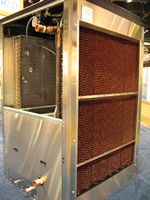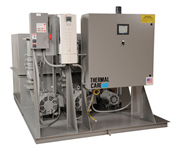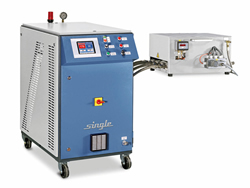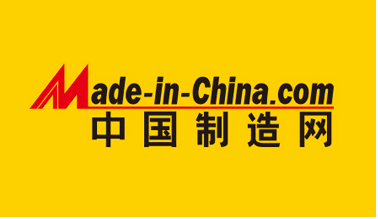Resources
Process Cooling Goes for Performance Plus Affordability
At the NPE 2009 show in Chicago, half a dozen exhibitors showed new cooling equipment that emphasized improved performance at about the same or lower cost. Major themes at the show were new equipment to meet EPA restrictions on R22 refrigerant next year, adiabatic fluid coolers to provide ambient-air cooling, refinements in low-energy frictionless chillers, and several new or improved liquid temperature-control units (TCUs)—including one developed specifically for Variotherm thermal cycling of molds.
REPLACING R22 REFRIGERANT
Starting January 1, 2010, no new chillers can be built to use R22 refrigerant, according to U.S. EPA rules. Processors can continue to use existing equipment, and they can still buy R22 to service that equipment, though global caps on R22 production and imports are expected to make that old standby gradually more expensive and harder to get. U.S. chiller manufacturers have not been waiting for the deadline. Since early this year, they have been announcing new chillers optimized for alternative refrigerants that are less damaging to the atmospheric ozone layer. (For example, we reported on such chillers from Conair in March, and from AEC, Sterling, and Colortronic in June.)
 |
| New adiabatic systems that use “free” ambient-air cooling were shown by Advantage Engineering, Frigel, and Thermal Care. This system from Advantage automatically lets water run down the vertical panel of absorbent media to cool incoming air on hot days. |
At NPE, Advantage Engineering announced that its Maximum Series portable chillers (2 to 20 tons) would use R410a refrigerant. Because R410a operates at significantly higher pressures than R22, many components must be more robust than is standard in conventional chillers. Advantage also announced that 5-, 10-, and 15-ton models can be equipped with Copeland’s new digital scroll compressor and new Advantage controls that save energy by modulating chiller capacity from 20% to 100% load and eliminating the conventional hot-gas bypass valve. According to the company, a 10-ton unit running at 50% capacity uses 18% less energy than older models with hot-gas bypass.
For now, larger Advantage chillers will use R407c, owing to difficulty in obtaining larger components to handle R410a pressures. But the company’s ultimate goal is to use R410a across the board.
As reported in May, NPE was the official debut of Mokon’s new Iceman portable and central chillers with R407c refrigerant in place of R22. Mokon says existing Iceman chillers can be retrofitted for R407c without a major overhaul.
In March, Thermal Care announced its MX Series central chillers (50 to 125 tons) using R134a refrigerant. At NPE, the company brought out its NQ Series portable chillers (2 to 40 tons) with R410a refrigerant and all-aluminum micro-channel condensers that require a smaller refrigerant charge. In designing these models, the company’s goal was to keep cost the same and add features and reliability. One-piece fan assemblies on air-cooled models add reliability and reduce noise by 4 to 11 dbA compared with older models. Other improvements include 24V control voltage in place of 115V for greater safety, RTD sensors in place of thermocouples, and a stepper-motor-driven valve in place of a solenoid for hot-gas bypass. Pressure gauges are now mounted on the front instead of the back. The NQ Series also comes with a Panasonic PLC and color touchscreen that flashes alarms in red or warnings in yellow, with plain-English messages and a list of troubleshooting tips, plus capacity for remote diagnostics. In models of 20 tons and larger, the two compressors are now independently controlled.
Delta T Systems is about to release a series of chillers with R407c refrigerant. It has used R134a in its 1-ton models for years. Berg Chilling systems is working on larger models that will use R410a. It is also developing chillers for high ambient temperatures.
Regloplas, a Swiss-based TCU manufacturer, has formed a joint venture with Industrial Frigo, an Italian chiller supplier. Reglochill units range from 0.5-ton portable to 150-ton central models, both air- and water-cooled. These units use R407c. Regloplas now also offers cooling towers up to 300-ton capacity.
 |
| Thermal Care redesigned its pump tanks for higher performance and lower cost. They now come with a PLC and color touchscreen to provide diagnostic and operating information on all pumps, tower fans, and chillers in a system. |
ADIABATIC COOLERS MULTIPLY
Another prominent theme at NPE was adiabatic fluid coolers to provide low-cost cooling year-round with limited water consumption and without glycol. Savings in water, chemicals, energy, maintenance, and sewage charges relative to a cooling tower are said to be substantial. These systems use outdoor air cooling of a “dry” closed-loop water system, plus occasional limited evaporative cooling in hot periods. Frigel North America has been promoting adiabatic cooling since NPE 2006 with its Ecodry system (see Learn More). As we reported in February, the latest version of this system is the Ecodry EDK, which offers enhanced overall cooling capacity compared with the previous Ecodry EDG system.
At NPE, Advantage Engineering launched its Hydra Hybrid Cooler. Up to around 75 F ambient temperature, the system operates in “dry” mode with air cooling only. Above that temperature, it automatically switches to adiabatic mode, filling a sump with water and pumping it to wet a vertical panel of absorbent media that cools incoming air by evaporation. When the temperature drops, the system switches back to dry mode and drains the sump to prevent contamination.
Thermal Care also introduced an adiabatic cooler, also called the Hybrid Series. The company claims this system can operate at 46 F outdoor temperatures without glycol and can provide 85 F water in summer, the same as a cooling tower. In summer adiabatic mode, the system creates a fine mist spray, but no water gets on the cooling coils, so no mineral deposits can result.
MORE CHILLING NEWS
The newest technology in central chillers is the so-called frictionless, variable-speed compressor with oil-free magnetic bearings (see Learn More). This unique Danfoss Turbocor compressor technology is said to be more compact, quieter, and lower in maintenance than standard central chillers and to be more energy efficient at reduced loads. This technology was first introduced to the plastics market by Thermal Care in 2004. The latest enhancements to its TC chillers include a new Panasonic PLC control with color touchscreen as standard. It can control up to six refrigeration circuits with a common setpoint, and a new ambient-temperature sensor allows it to optimize summer/winter performance automatically.
As we reported in May, Frigel introduced the newest system based on the Turbocor compressor at NPE. Its Heavygel EFX (formerly called Ecoflex) modular central chilling stations can be linked together for expandability.
Thermal Care redesigned its pump tanks to reduce cost and boost performance. They now come with a Panasonic PLC, whose color touchscreen provides single-point control and diagnostic and operating information on a system’s pumps, tower fans, and chillers.
 |
| Single’s new STWS TCU with accompanying valve station provides thermal cycling of molds from hot to cold within an injection cycle. |
Shini USA, division of Budzar Industries, is now supplying central air-cooled chillers from Shini Plastics Technologies of Taiwan. Up to now, Shini has offered only portable chillers here.
Part of the new chiller line from Regloplas is the IES (Integrated Energy Saving) system, which combines a central chiller and outdoor “free” cooling in one unit. It’s a closed-loop system with zero water consumption. A notable feature of the system is that with a small valve package at each molding machine, the system can modulate the water temperature at each press individually and with up to 40% lower energy than with an adiabatic system plus dedicated chillers at each machine.
HOT-WATER & OIL TCUs
Advantage is now offering a hot-water TCU for up to 250 F that includes a 60-gpm, sealless centrifugal pump. The pump never needs seals replaced, though it adds a cost premium.
As reported in May, Mokon has expanded its Hydrotherm II hot-water TCU line with larger models of 18 and 24 kw.
Single Temperature Controls showed off its new STWS model TCU designed for Alternating Temperature Technology (ATT). Also commonly known in Europe as Variotherm technology, ATT is a method of rapidly thermal cycling the mold from hot to cold within an injection molding cycle to permit easier filling, lower stresses, and improved replication of surface detail. The STWS TCU contains a separate valving station so that it can switch rapidly from hot to cold water and vice versa. The system was developed together with a German molder and it also requires an appropriately designed mold with thermally conductive metal inserts and/or conformal cooling channels instead of straight gun-drilled channels.
Thermal Care has a newly redesigned line of Aquatherm TCUs for up to 250 F. They are more compact than before, have an easier to read control panel with pressure gauges on the front instead of back, four swivel casters instead of two for easier mobility, 24V controls for added safety, tool-free access for maintenance, and two levels of control (standard and premium). Also, the perforated-metal top panel has been eliminated to protect from liquid spills.
Wittmann introduced two new TCUs at NPE. One is the Tempro Direct C 250, a direct-cooling unit with increased capacity (250 liters/min) for large molds and heating capacity up to 250 F. The single-zone unit is available with 12 or 24 kw heater. The most significant design feature is that the centrifugal pump is mounted horizontally, which allows for better venting of air in the circuit so that there is no cavitation and overheating that can damage the seal. Longer seal life is said to result.
The second new TCU is the Tempro plus C 350, a pressurized-water system for up to 350 F, eliminating the need for hot oil. It comes with up to 7 hp pump capacity for large molds.
- What affects injection mold machining accuracy and productivity?
- Shenzhen top five mold manufacturers: how plastic products are processed and produced?
- Shenzhen Ideal Vowin mold manufacturer: how to effectively improve the precision of mold processing?
- Chrome plating, a process that makes cars stylish
- Six injection molding processing technologies for home appliance plastic products
- Advantages and disadvantages of injection molding vs blow molding
- What is automotive hot stamping and molding technology?
- What is the difference between a hot runner and a cold runner in the mold?
- Automotive stamping die in large, precision and other areas of progress is obvious, the rapid development of plastic and rubber molds
- The top ten problems that are likely to occur in the mold testing process














